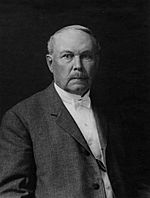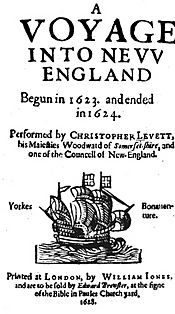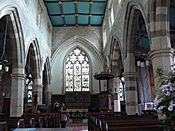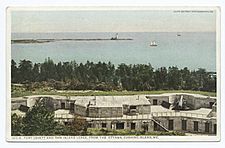Christopher Levett facts for kids
Quick facts for kids
Capt. Christopher Levett
|
|
|---|---|
| Born |
Christopher Levett
5 April 1586 York, England
|
| Died | 1630 (aged 43–44) aboard the Porcupine, Atlantic ocean
|
| Resting place | buried at sea |
| Nationality | English |
| Occupation | English naval captain, explorer, author |
| Known for | explorer of New England; granted 6,000 acres to settle Colony of York (now Portland, Maine), 15 May 1623 |
| Title | Captain; His Majesty's Woodward of Somersetshire; Principal, Plymouth Council for New England |
| Spouse(s) | Mercy Levett (née More); Frances Levett (née Lottisham) |
| Children | Sarah Levett Hitch; Mary Levett; Rev. Jeremiah Levett; Timothy Levett; Elizabeth Levett |
| Parent(s) | Percival Levett, Elizabeth (née Rotherforth) Levett |
| Signature | |
Captain Christopher Levett (born April 15, 1586 – died 1630) was an English writer, explorer, and naval captain. He was born in York, England. He explored the coast of New England and was given permission by the King to start a settlement in what is now Portland, Maine. He was the first European to try this.
Levett left a small group of settlers in Maine, but they were never heard from again. No one knows what happened to them. As a member of the Council for New England, Levett was also named Governor of Plymouth in 1623. He helped Captain Robert Gorges try to start an English colony in Weymouth, Massachusetts, but that also failed. In 1628, Levett was also named an early governor of Virginia.
Early Life and Exploration
Levett was the son of Elizabeth and Percival Levett, who was a merchant and innkeeper in York. Christopher Levett became a merchant himself. He also joined the Company of Merchant Adventurers in the City of York. It seems he became interested in exploring North America even while working as a merchant.
Christopher Levett later became restless and decided to become an explorer. He worked for King James I as His Majesty's Woodward of Somersetshire. This job involved managing royal forests. He even wrote a guide on how to cut down trees for the Royal Navy.
Later, Levett lived in Sherborne, Dorset. He became very interested in starting colonies in New England. He joined the Council for New England. King James I of England gave him about 6,000 acres (24 square kilometers) of land in present-day Maine. Levett wanted to name his new settlement "York" after his hometown.
On May 5, 1623, records show that Christopher Levett was given the right to this large piece of land. The next month, on June 26, 1623, the King said he liked Levett's plan to build a city called York in New England. The King even asked churches across England to collect money to help Levett with his settlement.
Some historians believe Levett got help with his plans because he became friends with George Villiers, 1st Duke of Buckingham. This powerful friend likely helped Levett get his job in Somersetshire and move closer to other explorers like Sir Ferdinando Gorges.
On June 26, 1623, Secretary of State Lord Conway wrote to Lord Scrope, asking him to help Levett. Levett wanted to settle in New England with people from Yorkshire and create "a Citty and call it by the name of Yorke." This means the first "New York" planned for America was actually in Portland, Maine!
Voyage to New England
Christopher Levett was different from some other early settlers. While people like Sir Ferdinando Gorges were mostly focused on making money, Levett seemed to care more about his relationships with Native Americans. He also had a Puritan wife, which was unusual for the time.
Levett, driven by his desire to explore, sailed from England to explore the coast of New England. He paid special attention to what is now Maine and New Hampshire.
When he returned to England, he wrote a book called "A Voyage into New England, Begun in 1623, and Ended in 1624." Levett hoped his book would encourage more people to move to the New World. As the first person to claim land in what is now Portland, Maine, he hoped to make money from the new settlement.
Captain Levett seemed like the perfect person to lead such a settlement. He was well-connected and richer than other explorers like Captain John Smith. Levett was interested in New England's rich fishing areas. He told Gorges that if they had a permanent colony, ships could fish all year round, which would double their profits.
Challenges and Later Life
Despite his good connections, things did not go as planned for Levett. Public interest in new settlements in Maine began to fade as other colonies, like Virginia, became more popular. King Charles I of England was facing his own problems in England, which also reduced interest in colonization. The King's request for money to support Levett's plan in Yorkshire churches did not raise much.
Meanwhile, Levett was given other important tasks in England. On October 5, 1625, Captain Levett commanded the ship HMS Susan and Ellen. This ship was part of a large fleet sailing against the Spanish fleet at Cadiz. This mission did not go well, and the fleet returned to England in disgrace. Levett later complained that he was treated "no better than a mere slave" during the expedition.
Levett never returned to Maine. The small group of men he left behind in a stone house were never heard from again. Levett's land eventually went to a group of merchants from Plymouth, as Levett focused on his naval duties. Levett later visited the Massachusetts Bay Colony in 1630, where he met Governor John Winthrop. He died on his way back home, aboard the ship Porcupine. His body was buried at sea.
Fort Levett on Cushing Island, Maine in Portland Harbor is named after this early explorer. Also, York County, Maine, gets its name from Captain Levett's original name for his settlement.
Even after his death, Captain Levett's letters caused some debate. Letters he carried from John Winthrop and other leaders of the Massachusetts Bay Colony to friends in England were found after his death. These letters caused some controversy in England because they were critical of the English church.
Captain Levett had six children. Four were with his first wife, Mercy More. His second wife was Frances Lottisham, and they had two children. One of his sons, Jeremiah, became a church leader. His daughter Sarah married a church leader who later became the Dean of York.

See also
 In Spanish: Christopher Levett para niños
In Spanish: Christopher Levett para niños
 | Stephanie Wilson |
 | Charles Bolden |
 | Ronald McNair |
 | Frederick D. Gregory |




